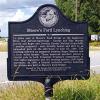WTH? Athens
Grave Situation

Shirley Hudson and her sister, Jackie Williams, in front of their Allenville family home.
Find yourself driving there at 5 p.m. on a weekday or after a football game lets out, and you might feel like you're spending an eternity on Milledge Avenue. For Jennifer Burton and I.V. Allen, though, this is not just a figure of speech. Their graves lie on the side of the road across from East Campus Drive, in between rental houses occupied by college students. Partially hidden behind a fence bearing a "no dumping" sign, they are, quite literally, spending eternity on Milledge Avenue.
Curious reader Andrea Gonzalez asked me to get the story behind "those two random graves on the side of the road." Who are these people, and how did they come to rest there?

Right by East Campus Road, these graves are reminders of a thriving community and the people who lived there.
A short walk behind the graves leads to what appears to be a vacant lot filled with vines and crumbling concrete. Closer inspection reveals that the concrete bears names: lyrical ones they don't make any more. Hattie, Birdie, Milus and Seaborn: a novel's worth of names buried with their owners under slumping dirt and creeping ivy. This is the Allenville cemetery, unmarked and unmaintained, but not entirely forgotten.
At the turn of the 20th century and up until the 1960s, Allenville was a close-knit, thriving black community. Anchored by what in 1916 was a one-room building that served as both school and church, and what is now the Thankful Baptist Church, the community was considered a well-off, fortunate place to live by many African Americans.
"It was a good thing to be from Allenville," remembers Shirley Hudson, who grew up in the community. "We were self-sufficient, had pigs and chickens and big gardens. We'd take our corn down to the mill to grind it, and if some girl needed to go to the prom, we'd find her a dress. Then the next week, some other girl would wear the same dress to her prom. We hardly ever went into Athens. We had everything we needed, right there."
It's bewildering for us now to think of East Campus Road as not "in Athens," but Mrs. Hudson describes an idyllic rural life right down the road from the Five Points intersection. The residents of Allenville had their own country store to serve them, run by Mr. Claude Jackson, and their own softball and baseball teams. Her father, Mr. Samuel David Latten, Jr., was a Boy Scout leader when he wasn't driving a truck, and the neighborhood hosted an army of kids from up north every summer, the children of friends of friends who wanted to escape the stifling streets of Baltimore and D.C. Life in Allenville was comfortable, predictable and stable. But then things, as they always do, changed.
One morning in the early '60s, the community woke up to find they lived someplace else. Overnight, the sign demarcating the Athens city limits had been moved from near Memorial Park out to Macon Highway, and just like that, Allenville belonged to Athens.

Sisters Jackie Williams and Shirley Hudson in front of their Allenville family home.
"I wasn't smart enough back then to know what it meant," remembers Mrs. Hudson, "But Daddy did." The newest residents of the city now had to pay heavier taxes and get rid of their hogs and chickens, a development that delighted the chore-weary Mrs. Hudson but troubled her father. "He wasn't happy about that," says Hudson. "That was how we stayed fed."
Other changes followed rapidly. According to Mrs. Hudson, the city condemned many of the houses in Allenville. The residents, most of whom rented, moved away from the community to subsidized housing, to family members in other parts of Athens or out of state. Only one person fought the city's plans.
"Mr. Arthur Crawford, he owned his house. He fought the city to keep it. They found a hundred things wrong with his house, and he fixed every one of them. He died recently, but his house is still standing, up there on that hill."
Today, only a few of the original houses remain. The rest of the community lies buried under the dorms on South Milledge Extension, the intramural fields across from the Ramsey Center and, of course, in the Allenville Cemetery. The last person to be interred there, before the cemetery ran out of room, came from the family that gave the community its name. I.V. Allen lies next to her granddaughter Jennifer Burton, a cousin of Mrs. Hudson. Mrs. Hudson remembers Jennifer as a vivacious, happy girl.
"She was killed in an automobile accident," says Hudson. "We never did find out what happened, whether she fell [out of the vehicle] or was thrown. She was young, only 23."
Now, on a street filled with student housing and game-day traffic, Mrs. Allen's and Miss Burton's tombstones memorialize not only their lives, but the life of the community where they lived. Like the church steeple on Oconee, the train trestle on Poplar Street and the parking lot where Legion Pool used to be, they are the ghosts of old Athens.
For her part, though, Shirley Hudson is not haunted by her vanished past. Perhaps her close community instilled a certain strength and optimism in her, or maybe it came from 35 years of helping Athenians as a social worker and hospital employee. Or it could be the name of her father, inscribed in a window of Thankful Baptist Church and reminding her not of what she's lost, but what she gained from a loving, functional family. Whatever the reason, Mrs. Hudson says she's not bitter about the changes she's witnessed.
"I'm so proud to be from Allenville, and from Athens," says this youthful, friendly woman. "I started out with everything and ended up with more."












comments